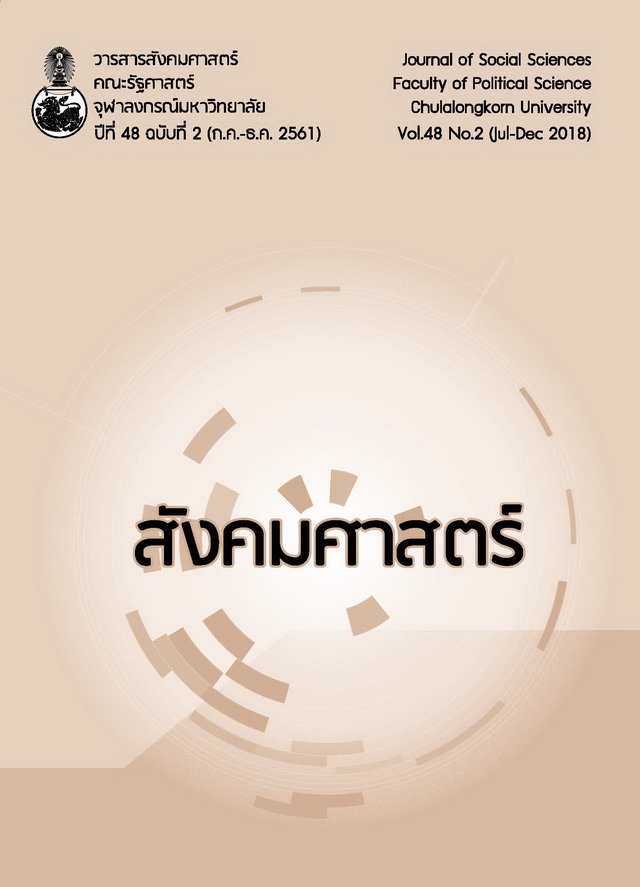การเปลี่ยนผ่านไปสู่ประชาธิปไตยเปรียบเทียบ: แง่คิดต่อความล้มเหลวในการเปลี่ยนผ่านไปสู่ประชาธิปไตยของไทย
DOI:
https://doi.org/10.61462/cujss.v48i2.745คำสำคัญ:
ประชาธิปไตยที่เป็นปึกแผ่น, วิธีการศึกษาเปรียบเทียบ, การออกแบบสถาบัน, คลื่นลูกที่สามของประชาธิปไตยบทคัดย่อ
การเปรียบเทียบด้วยวิธี “ความแตกต่างมากที่สุดเพื่ออธิบายผลลัพธ์ร่วมกัน” จากประสบการณ์ของเกาหลีใต้ อินโดนีเซีย อาร์เจนตินา ชิลี ตูนิเซีย ไนจีเรีย ยูเครน และโปแลนด์ พบว่าปัจจัยสำคัญที่ส่งผลต่อความสำเร็จในการเปลี่ยนผ่านไปสู่ประชาธิปไตยในช่วงคลื่นลูกที่ 3 คือ 1. การผนึกกำลัง และการประนีประนอมของพลังฝ่ายค้านที่ต้องการประชาธิปไตย 2. บทบาทของผู้นำที่มีวิสัยทัศน์ จริงใจต่อการวางรากฐานระบอบประชาธิปไตย 3. ความเห็นพ้องยอมรับทั้งเนื้อหาและกระบวนการร่าง/แก้ไขรัฐธรรมนูญ 4. กองทัพอยู่ภายใต้รัฐบาลพลเรือน 5. จัดให้มีการเลือกตั้งโดยเร็วตามควร การศึกษาเปรียบเทียบเช่นนี้ชี้ให้เห็นว่าความล้มเหลวในการเปลี่ยนผ่านไปสู่ประชาธิปไตยของไทย มีที่มาจากความแตกแยกและทะเลาะกันเองในฝ่ายที่สนับสนุนประชาธิปไตย ไม่ปรากฏชัดว่าผู้นำทางการเมืองทั้งที่มาจากการเลือกตั้งและชนชั้นนำในสังคมมีเจตนารมณ์และความมุ่งมั่นในการวางรากฐานประชาธิปไตย ขาดฉันทามติในการปฏิรูปรัฐธรรมนูญ การดำรงอยู่ของกองทัพเหนือรัฐบาลพลเรือน และการที่การเลือกตั้งของไทยยังไม่เป็นสถาบันที่ได้รับการยอมรับว่าเป็นเครื่องมือในการแก้วิฤตการเมืองและเป็นปัจจัยเบื้องต้นของการเปลี่ยนผ่านไปสู่ประชาธิปไตย
Downloads
เอกสารอ้างอิง
Alberts, Susan, Chris Warshaw, and Barry R. Weingast. 2012. “Countermajoritarian Institutions and Constitutional Stability.” Accessed November 13, 2015. http://www.researchgate.net/publication/ 265631798.Countermajoritarian _Institutions_and_ Constitutional_Stability.
Alfano, Alyssa. 2011. “A Personal Perspective on the Tunisian Revolution.” In The Arab Spring of Discontent: A Collection from e-International Relations, edited by Alasdair McKay, 6-7. Bristol: e-International Relations. Accessed January 27, 2017. http://www.e-ir.info/wp-content/uploads/ arab-spring-collection-e-IR.pdf.
Barany, Zoltan. 2012. The Soldier and the Changing State: Building Democratic Armies in Africa, Asia, Europe, and the Americas. Princeton: Princeton University Press.
Carnegie, Paul J. 2010. The Road from Authoritarianism to Democratization in Indonesia. New York: Palgrave Macmillan.
Cavarozzi, Marcelo. 1992. “Patterns of Elite Negotiation and Confrontation in Argentina and Chile.” In Elites and Democratic Consolidation in Latin America and Southern Europe, edited by John Higley and Richard Gunther. Cambridge: Cambridge University Press.
Crouch, Harold. 2010. Political Reform in Indonesia after Soeharto. Singapore: Institute of Southeast Asian Studies.
Dahl, Robert Alan. 1971. Polyarchy: Participation and Opposition. New Haven, CO: Yale University Press.
Downs, Anthony. 1957. An Economic Theory of Democracy. Boston: Addison-Wesley.
The Economist Intelligence Unit. 2016. “Democracy Index 2016: Revenge of the “deplorable.” London: The Economist. Accessed May 28, 2017. http://felipesahagun. es/wp-content/ uploads/2017/01/Democracy-Index-2016.pdf
Flyvbjerg, Bent. 2006. "Five Misunderstandings about Case-Study Research." Qualitative Inquiry 12(2): 219-245. doi: 10.1177/1077800405284363.
Geddes, Barbara. 1990.“How the Cases You Choose Affect the Answers You Get: Selection Bias in Comparative Politics.” Political Analysis 2(Winter): 131-150.
Haerpfer, Christian W. 2009. “Post-Communist Europe and Post-Soviet Russia.” In Democratization, edited by Christian W. Haerpfer, Patrick Bernhagen, Ronald F. Inglehart and Christian Welzel. Oxford: OUP.
Huntington, Samuel P. 1991. “Democracy’s Third Wave.” Journal of Democracy 2(2): 12-34.
-----. 1968. Political Order in Changing Societies. New Haven, CO: Yale University Press.
Indrayana, Denny. 2008. Indonesian Constitutional Reform 1999-2002: An Evaluation of Constitution-Making in Transition. Jakarta: KOMPAS Book Publishing.
Kaldor, M.and I. Vejvoda. 1999. Democratisation in Central and Eastern Europe. London:Pinter.
Kirshner, Alexander S. 2014. A Theory of Militant Democracy: The Ethics of Combating Political Extremism. New Haven, CO: Yale University Press.
Lee, Hongsub. 2001. “Transition to Democracy in Poland.” East European Quarterly 35(1): 87-95.
Merkel, Wolfgang. 2004. “Embedded and Defective Democracies.”Democratization 11(5): 33-58. doi:10.1080=13510340412331304598.
Mill,John Stuart. 1843. A System of Logic, Ratiocinative And Inductive. London: Longman. Accessed E-book, May 25, 2016. https://www.gutenberg.org/files/27942/27942-pdf.pdf
Musa, Sani. 2006. The Nigerian Political Economy in Transition. Afrika: Friedrich Ebert Stiftung. Accessed July 29, 2016. http://library.fes.de/pdf-files/iez/03522.pdf.
Pastor, Daniel. 2004. “Origins of the Chilean Binominal Election System.”Revista de Ciencia Politica 24(1): 38-57. Accessed July 30, 2016. http://www.scielo.cl/scielo.php?script=sci_arttext& pid=S0718-090X2004000100002.
Paths to Democracy in Europe 1974-1991: An Overview. 2011. Berlin: Democracy Reporting International; Lisboa: Instituto Português de Relações Internacionais.
Przeworski, Adam, and Henry Teune. 1970. The Logic of Comparative Social Inquiry. New York: John Wiley.
Puchalska, Bogusia. 2005. “Polish Democracy in Transition?” Political Studies 53(4): 816-832.
Puddington, Arch, and Tyler Roylance. 2017. Populists and Autocrats: The Dual Threat to Global Democracy. Freedom in the World 2017. Washington, DC: Freedom House. Accessed October 28, 2017. https://freedomhouse.org/sites/ default/files/ FH_FIW_ 2017_Report_Final.pdf
Rawls. John. 1999. A Theory of Justice. 2nd ed. Cambridge, MA: Belknap Press.
Rustow, Dankwart. 1970. “Transitions to Democracy: Toward a Dynamic Model.” Comparative Politics 2(3) (April): 337-363
Schedler, Andreas.1998. “What Is Democratic Consolidation?” Journal of Democracy 9(2): 91-107.
Smith, Peter H. 2012. Democracy in Latin America: Political Change in Comparative Perspective. 2nd ed. Oxford: Oxford University Press.
Suberu, Rotimi T., and Larry Diamond. 2002. “Institutional Design, Ethnic Conflict Management, and Democracy in Nigeria.” In The Architecture of Democracy, Constitutional Design, Conflict Management, and Democracy, edited by Andrew Reynolds. Oxford: Oxford University Press.
Sung-Joo, Han. 1988. "South Korea in 1987: The Politics of Democratization." Asian Survey 28(1): 52-61.
Wilawan Yithong. 2014. “Krabuankan Phatthana Prachathippatai Nai Prathet Protuket Lae Prathet Sapen: Chutroemton Khong Khluen Luk Thi Sam Haeng Kan Phatthana Prachathippatai.” [Democratic development in Portugal and Spain: The Beginning of the Third Wave of Democratization]. Warasan Kanmueang Kan Pokkhrong [Journal of Politics and Governance] 4(2): 223-240 (in Thai).
Wolczuk, Kataryna. 2001. The Moulding of Ukraine: The Constitutional Politics of State Formation. Budapest, Hungary: Central European University Press.
ดาวน์โหลด
เผยแพร่แล้ว
รูปแบบการอ้างอิง
ฉบับ
ประเภทบทความ
สัญญาอนุญาต
ลิขสิทธิ์ (c) 2018 คณะรัฐศาสตร์ จุฬาลงกรณ์มหาวิทยาลัย

อนุญาตภายใต้เงื่อนไข Creative Commons Attribution-NonCommercial-NoDerivatives 4.0 International License.
เงื่อนไขการอนุญาตสาธารณะ
นโยบายลิขสิทธิ์และการอนุญาต
วารสารสังคมศาสตร์ จุฬาลงกรณ์มหาวิทยาลัย เผยแพร่เนื้อหาทั้งหมดภายใต้ สัญญาอนุญาตครีเอทีฟคอมมอนส์แบบแสดงที่มา-ไม่ใช้เพื่อการค้า-ไม่ดัดแปลง 4.0 นานาชาติ (CC BY-NC-ND 4.0)
ลิขสิทธิ์
บทความทั้งหมดที่ตีพิมพ์ในวารสารสังคมศาสตร์ จุฬาลงกรณ์มหาวิทยาลัย เป็นลิขสิทธิ์ของ คณะรัฐศาสตร์ จุฬาลงกรณ์มหาวิทยาลัย ผู้เขียนจะโอนสิทธิ์ทั้งหมดให้แก่วารสารเมื่อบทความได้รับการตอบรับให้ตีพิมพ์
สัญญาอนุญาต CC BY-NC-ND 4.0
ภายใต้สัญญาอนุญาตนี้:
-
แสดงที่มา (BY): ผู้ใช้ต้องแสดงที่มาโดยอ้างอิงถึงผู้เขียน คณะรัฐศาสตร์ จุฬาลงกรณ์มหาวิทยาลัย และวารสารสังคมศาสตร์ จุฬาลงกรณ์มหาวิทยาลัย พร้อมทั้งให้ลิงก์ไปยังสัญญาอนุญาต และระบุหากมีการเปลี่ยนแปลง ทั้งนี้สามารถทำได้ในลักษณะที่สมเหตุสมผล แต่ต้องไม่ทำในลักษณะที่แสดงว่าผู้อนุญาตให้การรับรองผู้ใช้หรือการใช้งานดังกล่าว
-
ไม่ใช้เพื่อการค้า (NC): ผู้ใช้ไม่สามารถใช้เนื้อหาเพื่อวัตถุประสงค์ทางการค้า การใช้งานเชิงพาณิชย์จะต้องได้รับอนุญาตเป็นลายลักษณ์อักษรล่วงหน้าจากผู้เขียนและคณะรัฐศาสตร์ จุฬาลงกรณ์มหาวิทยาลัย
-
ไม่ดัดแปลง (ND): หากผู้ใช้นำเนื้อหาไปรวม ดัดแปลง หรือต่อยอด ผู้ใช้ไม่สามารถเผยแพร่งานที่ดัดแปลงนั้นได้ การดัดแปลงผลงานจะต้องได้รับอนุญาตเป็นลายลักษณ์อักษรล่วงหน้าจากผู้เขียนและคณะรัฐศาสตร์ จุฬาลงกรณ์มหาวิทยาลัย
นโยบายการเข้าถึงแบบเปิด
วารสารสังคมศาสตร์ จุฬาลงกรณ์มหาวิทยาลัย ให้การเข้าถึงเนื้อหาแบบเปิดโดยทันทีตามหลักการที่ว่าการทำให้งานวิจัยสามารถเข้าถึงได้อย่างเสรีแก่สาธารณะจะสนับสนุนการแลกเปลี่ยนความรู้ในระดับโลก ผู้ใช้สามารถอ่าน ดาวน์โหลด คัดลอก เผยแพร่ พิมพ์ ค้นหา หรือเชื่อมโยงไปยังเนื้อหาฉบับเต็มของบทความได้โดยไม่ต้องขออนุญาตล่วงหน้าจากผู้จัดพิมพ์หรือผู้เขียน ทั้งนี้เป็นไปตามสัญญาอนุญาต CC BY-NC-ND 4.0
นโยบายการเก็บบันทึกด้วยตนเอง
ผู้เขียนสามารถเก็บบันทึกบทความฉบับตีพิมพ์สุดท้าย ต้นฉบับที่ส่ง (preprint) หรือฉบับที่ผ่านการประเมิน (postprint) ในคลังสถาบันหรือเว็บไซต์ส่วนตัวได้ โดยต้องมีการอ้างอิงการตีพิมพ์ครั้งแรกในวารสารสังคมศาสตร์ จุฬาลงกรณ์มหาวิทยาลัย พร้อมระบุแหล่งอ้างอิงที่สมบูรณ์และลิงก์ไปยังเว็บไซต์ของวารสาร
การขออนุญาต
สำหรับการใช้งานนอกเหนือจากที่ครอบคลุมโดยสัญญาอนุญาต CC BY-NC-ND 4.0 กรุณาติดต่อ:
กองบรรณาธิการ
วารสารสังคมศาสตร์ จุฬาลงกรณ์มหาวิทยาลัย
คณะรัฐศาสตร์ จุฬาลงกรณ์มหาวิทยาลัย
Email: cusocscij@gmail.com
สำหรับข้อมูลเพิ่มเติมเกี่ยวกับสัญญาอนุญาตครีเอทีฟคอมมอนส์แบบแสดงที่มา-ไม่ใช้เพื่อการค้า-ไม่ดัดแปลง 4.0 นานาชาติ กรุณาเยี่ยมชม: https://creativecommons.org/licenses/by-nc-nd/4.0/deed.th





